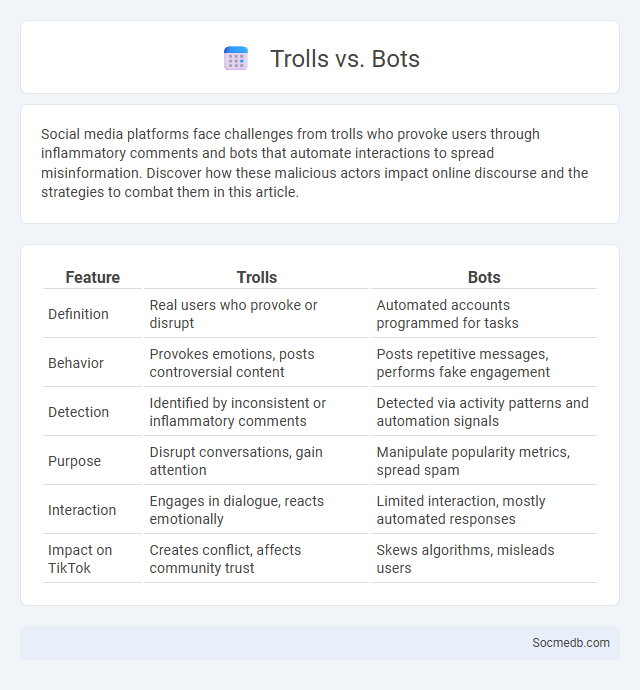
Photo illustration: Trolls vs Bots
Social media platforms face challenges from trolls who provoke users through inflammatory comments and bots that automate interactions to spread misinformation. Discover how these malicious actors impact online discourse and the strategies to combat them in this article.
Table of Comparison
| Feature | Trolls | Bots |
|---|---|---|
| Definition | Real users who provoke or disrupt | Automated accounts programmed for tasks |
| Behavior | Provokes emotions, posts controversial content | Posts repetitive messages, performs fake engagement |
| Detection | Identified by inconsistent or inflammatory comments | Detected via activity patterns and automation signals |
| Purpose | Disrupt conversations, gain attention | Manipulate popularity metrics, spread spam |
| Interaction | Engages in dialogue, reacts emotionally | Limited interaction, mostly automated responses |
| Impact on TikTok | Creates conflict, affects community trust | Skews algorithms, misleads users |
Understanding Trolls: Definition and Characteristics
Trolls are individuals who post inflammatory, off-topic, or disruptive messages on social media platforms to provoke emotional responses or derail conversations. Their behavior often includes anonymity, repeated harassment, and a desire to create conflict within online communities. Understanding these characteristics helps you recognize and manage trolls effectively, maintaining a positive digital environment.
What Are Bots? Key Features and Functions
Bots on social media are automated software programs designed to perform specific tasks such as posting content, engaging with users, and analyzing trends. Key features include rapid response times, the ability to handle repetitive activities, and scalability for large-scale interactions. Understanding your bot's functions can enhance social media management by increasing efficiency and maintaining consistent engagement.
Trolls vs Bots: Core Differences
Trolls are human users who intentionally provoke and manipulate conversations on social media to incite emotional reactions, spread misinformation, or disrupt communities. Bots are automated programs designed to mimic human activity, amplify messages, and influence online discourse by generating large volumes of posts or likes. Understanding the core differences between trolls and bots is crucial for developing effective strategies to combat online harassment and misinformation.
Types of Trolls and Their Motivations
Social media hosts various types of trolls, including the classic troll who seeks attention by provoking others, the griefers who aim to disrupt communities, and the impersonators spreading misinformation for personal or political gain. Their motivations range from boredom and desire for attention to ideological agendas and financial incentives behind fake accounts. Understanding these motivations helps you navigate online interactions with greater awareness and avoid falling victim to manipulative tactics.
How Bots Influence Online Conversations
Bots significantly shape online conversations by amplifying specific messages, often creating the illusion of widespread consensus or controversy. These automated accounts can rapidly spread misinformation, manipulate public opinion, and distort engagement metrics on platforms like Twitter, Facebook, and Instagram. The pervasive presence of bots complicates the authenticity of digital interactions, challenging users and algorithms to discern genuine human discourse from artificial amplification.
The Impact of Trolls on Social Media
Trolls on social media platforms disrupt online communities by spreading misinformation, inciting conflicts, and degrading user experience, leading to decreased engagement and trust. Their toxic behavior negatively impacts mental health, causing anxiety and stress among targeted individuals. Social media companies continuously develop algorithms and moderation tools to detect and mitigate troll activities, aiming to maintain safe and authentic interactions.
Identifying Bots: Signs and Detection Methods
Detecting bots on social media involves analyzing patterns such as unusually high posting frequency, repetitive content, and lack of personalized interaction. Tools like Botometer and machine learning algorithms evaluate account behavior, follower-to-following ratios, and metadata to flag potential automated accounts. Your ability to identify these signs ensures more authentic engagement and protects your online community from misinformation and spam.
Trolls vs Troll Farms: Scaling Misinformation
Trolls individually spread misinformation through targeted comments and viral posts, leveraging personal psychology to manipulate social media narratives. Troll farms operate on a larger scale, coordinating hundreds of fake accounts to amplify false content systematically, influencing public opinion and political discourse globally. These entities exploit platform algorithms and user behaviors, making detection and mitigation increasingly complex for social media companies.
Combating Trolls and Bots: Effective Strategies
Combating trolls and bots on social media requires deploying advanced AI algorithms that detect and flag suspicious behavior patterns in real-time. Your platform can benefit from implementing community moderation tools and user-reporting systems to promptly remove malicious content and maintain authentic interactions. Consistent updates to security protocols ensure the prevention of automated attacks, safeguarding your social media environment for genuine engagement.
The Future of Online Engagement: Trolls, Bots, or Both?
The future of online engagement is increasingly shaped by the rise of trolls and bots, which complicate authentic social interactions on social media platforms. Advanced AI-driven bots can mimic human behavior to spread misinformation or amplify certain viewpoints, while trolls actively provoke and disrupt conversations. Understanding and mitigating these challenges is crucial for preserving credible and meaningful digital communities.
 socmedb.com
socmedb.com